Finally, the Alarme Phone Sahara presents its report on the conference on the criminalisation of migration, in particular through the Nigerien "anti-smuggling" law 2015-036. The issues discussed remain highly topical.
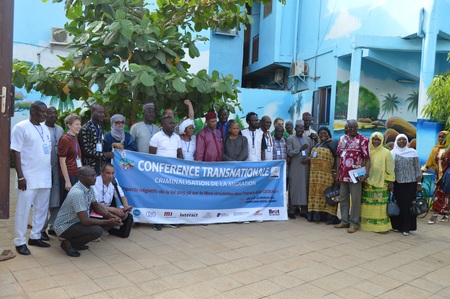
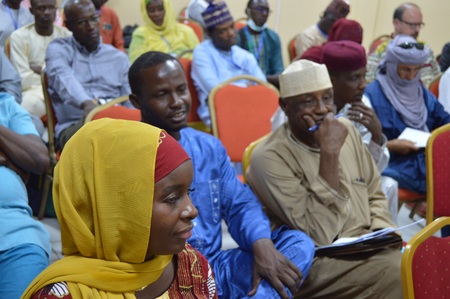
On 27 and 28 February 2023, a hybrid conference on the criminalisation of migration was organised by Alarme Phone Sahara (APS) in collaboration with partner organisations in Niamey at the Hotel Homeland, to launch a campaign for the substantive revision of Niger's law on migrant smuggling "2015-36". This law primarily serves the interests of the European Union in its ambition to stop as many migrants as possible heading north. It therefore also bears some responsibility for the many violations of the rights of people on the move crossing the desert.
The conference provided a forum for those affected by the criminalisation of migration, as well as activists from various civil society organisations and associations in Niger and other West African countries, and allies from Europe. Participants presented evidence of the harmful effects of law 2015-036 for people on migration routes and their safety, for Nigerien communities, particularly in the Agadez region, and also for freedom of movement throughout West Africa and the Sahel-Saharan zone. They also made legal and political demands at a time when the state of Niger has announced a review of the current version of the law.
The organisers consider the conference a success in several respects:
On the one hand, the composition of those present: There were activists from various civil society groups in Niger, including Action Non à la Loi 2015 - 036, Alternative Espaces Citoyens, and Observatoire Migrants en Détresse (OMD). They included people affected as migrants, but also as drivers or former providers of migration services, lawyers, international activists committed to the struggle for human rights and freedom of movement, journalists, researchers and also the National Human Rights Commission (CNDH Niger), represented by Ali Dodo, who holds the post of deputy general rapporteur.
The quality of the presentations, exchanges and debates is also to be commended.
27 February 2023: Workshop day: Consequences of law 036-2015 in the Sahel-Saharan zone: Demands from civil society
The first day of the conference was divided into 4 workshops:
Workshop 1 on Law 2015-036 in contradiction with the right to mobility in the ECOWAS area:
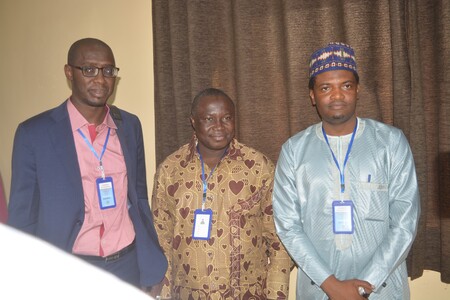
Lawyers Ibrahim Mukhtar, Mamadou Konaté and Basheer Sabiu
Lawyers Ibrahim Mukhtar and Basheer Sabiu from Nigeria and Mamadou Konaté from the Association Malienne des Expulsés (AME) presented the legal action brought before the ECOWAS Court of Justice against Niger's law 2015-036 in cooperation with Alarme Phone Sahara through its umbrella organisation Jeunesse Nigérienne au Service du Développement Durable (JNSDD), and the Association d'Etudes Juridiques sur l'Immigration (ASGI) from Italy. Also present was Ms Sani Aïssatou Garba, Registrar of the Tribunal des Grandes Instances in Niamey, Niger.
Law 2015-036 punishes human trafficking, as well as "illicit transport", accommodation and other services offered to migrants. It was drafted by French lawyers and adopted by the Nigerien parliament in 2015. It has been effectively implemented since 2016, following the Euro-African summit on migration held in Valletta and promises by European states to release large sums of money for migration control measures.
The reasons for the legal action are that law 2015-036 is likely to encourage violations of the freedom of movement guaranteed to nationals of ECOWAS member states since 1979 and at the same time individual human rights violations suffered by people on their travel routes. It was emphasised that the ECOWAS protocol guarantees all citizens of its member states the right to move freely within their territory. The legal experts present were convinced that the fact that a Niger law restricts this right, prevents or refuses passage to citizens of member states and punishes those who offer them a travel service, constitutes a clear violation.
Cases of people who have suffered concrete violations of their rights under Law 2015-036 were also presented in the application. The lawyers also called for the collection of further cases of affected individuals willing to testify to support the legal proceedings.
Apart from this, it was critically analysed that while ECOWAS member states have committed themselves to recognising the right to freedom of movement, this right, like efforts to create a common African economic space, is constantly being circumvented by selfish interests and arbitrary border closures by individual governments. Such a policy, guided by individual interests, coincides in part with the efforts of European players to stem the movement of people on the African continent in order to control migration.
Workshop 2 on (in)security policies in the Sahel and the consequences for circular migration and the regional economy
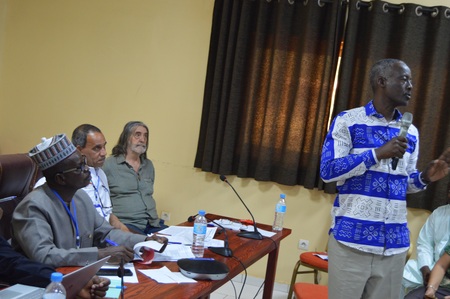
Hassane Boukar of Alternative Espace Citoyenne with Azizou Chéhou (APS and JNSDD),
Hassane Ammari (AMSV) and Father Mauro (SPM and OMD)
The workshop was introduced by Alassane Dicko from Afrique Europe Interact in Mali. He gave an historical overview of the fact that the Sahel-Saharan region has developed over many centuries in economic, social and cultural terms, with movements and exchanges between different regions and national territories. Travelling across borders, trading, looking for work or maintaining family ties is still an essential part of many people's social and economic existence today. Or as Alassane Dicko summed it up: "Freedom of movement is the right to live! "
Hassan Boukar of Alternative Espace Citoyenne (AEC) in Niamey began by outlining the vision of the ECOWAS protocol since 1979: Beyond free movement, the aim was to create an area of integration in West Africa, with a single passport for all member countries and without creating different national migration policies. Given these ambitions, policies such as the creation of law 2015-036 are a "hair in the soup" that only serve European interests. According to Hassane Boukar, a particularly nasty aspect of this law is the fact that it establishes an offence of "illegal exit from the territory", which in turn serves to criminalise the movement and transport of people across national borders within Niger. Boukar also criticised a discrepancy between the explicit content of the law and the way it is applied in practice, for example when military patrols are carried out along travel routes. In his view, some members of Niger's parliament were not really familiar with the details of Law 2015-036 when it was adopted and were therefore unaware of the consequences of its practical application.
Mamane Boukar, a former driver in the Agadez region, gave a gloomy assessment of the consequences of law 2015-036: He himself was put in prison 4 times on the basis of this law and 4 of his vehicles were confiscated. His experience is exemplary for many drivers who used to transport migrants and other passengers in the north of Niger and whose activity was degraded, almost overnight, from a legal and recognised profession to a criminal act, and whose vehicles were confiscated or detached by the forces of law and order. According to him, some of his former colleagues, as a result of this loss of income, ended up going into the drugs business and banditry. In addition, under the pressure of persecution and criminalisation, violent conflicts between drivers have increased in the Agadez region.
During the conference, participants from Agadez repeatedly stressed the harmful consequences of the "anti-smuggling" law for the economic situation and social fabric of their region. For young people in particular, poverty and a lack of prospects have worsened, leading to a sharp increase in addiction problems and crime.
According to Mamane Boukar, there are also no solutions to be expected from the reconversation programmes promised to former migration service providers. For him, these programmes are nothing but pipe dreams. It is mainly international organisations that benefit from the funds made available, and almost nothing has yet reached the people of the Agadez region.
Workshop 3 on experiences of criminalisation and litigation against migrants and practices of solidarity with them
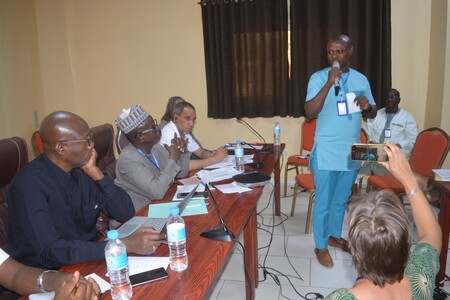
Rex Osa (Refugees for Refugees) speaking at the conference
Moctar Nalosso, a member of the Alarme Phone Sahara coordination team in Agadez, spoke about the day-to-day work of solidarity with people often affected by criminalisation. He also spoke of the way in which law 2015-036 creates a permanent factor of uncertainty, including for civil society activists, in particular because the vague and broad wording of the law means that no one can be sure at what point the authorities may try to assess practical solidarity support for migrants as a contribution to so-called "irregular migration".
With this in mind, Sadio Diallo, a Senegalese migrant living in Agadez, spoke of his own experience of being criminalised, as a whistleblower for Alarme Phone Sahara in Agadez and a committed member of his migrant community, and at the same time as an indirect victim of law 2015-036. Diallo himself found himself in the wheels of justice after supporting a man from the Senegalese community who had been arrested on charges brought under law 2015-036. An unsuccessful attempt to negotiate the release of his compatriot with the judge in charge of the case eventually led to his own transformation from supporter to defendant, forcing him to spend almost a year in pre-trial detention before finally being released without compensation.
Abdrahamane Ama of the Association of Ex Migration Service Providers from Agadez, gave an account of the experiences of people who worked in various positions in the migration sector, whether as drivers, accommodation operators or other trades, and who were faced overnight with the criminalisation of their activity and the removal of their means of economic subsistence.
Rex Osa, activist and founder of "Refugees 4 Refugees", who lives between Germany and Nigeria, contributed further perspectives on the criminalisation of migrants, based on his work with people deported from Europe to Nigeria.
Workshop 4 on the consequences of restrictive migration policies for migrants, tragedies in the Sahara and mass deportations to Niger
This workshop focused on the consequences of criminalisation and repressive migration policies on the safety and lives of people on the move.
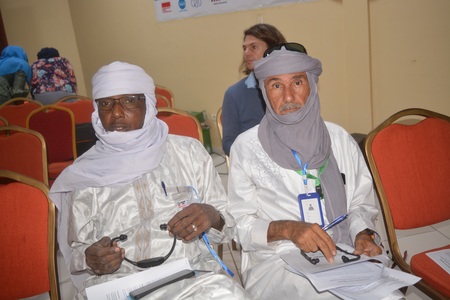
Laouel Taher (APS team Bilma and Kaouar desert)
and François Ibrahim (APS team Assamaka)
Laouel Taher shared his experiences as an Alarme Phone Sahara (APS) activist in Bilma in the north of Niger in the Kaouar desert. Laouel and his team are involved in rescue operations in this desert area, especially on the routes between Dirkou and the "Well of Hope", and maintain focal points in Diado, Dirkou, Latai and Bilma. To help save the lives of people who got lost, the APS team works on a pragmatic basis with non-governmental organisations, such as Doctors Without Borders (MSF) and the Red Cross, as well as with institutional structures. On several occasions, they have also found the bodies of people who have died in the desert and helped to contact the family members of the deceased.
Laouel also stressed that the capacities and resources currently available, both for rescue operations in the desert and for the recovery and identification of people who have died on travel routes, are far from sufficient given the extent of the desert areas and the many dangers.
For Laouel, law 2015-036 is one of the causes of many distress situations and cases of death in the desert. Because of criminalisation and the threat of legal action, drivers transporting migrants across the desert avoid routes where patrols and checkpoints are to be expected. Instead, they would take the most remote and dangerous routes, far from the officially designated routes.
The problem is particularly obvious if we compare the situation on the large trans-Saharan lorry convoys with the clandestinely organised transport of people. In the former case, drivers help each other out most of the time, even in the event of a breakdown or accident, so that passengers in a broken-down vehicle are generally taken care of by others. On the other hand, in the case of vehicles travelling alone on remote routes, there is often no one to come to their aid in the event of distress, so the people concerned are at the mercy of death.
François Ibrahim spoke about the extremely precarious situation in Assamaka, on the border between Niger and Algeria, where thousands of people are stuck after having been deported from Algeria in large convoys to the desert on the Niger border. The situation for deportees has worsened, firstly because since late 2022, early 2023, the Algerian government has significantly increased the number and pace of mass deportations compared with previous years. Secondly, there is a lack of supply and reception capacity on the spot, so much so that the IOM is now refusing newly arrived deportees access to its camp. All this has led to a humanitarian emergency in Assamaka, against which the Alarme Phone Sahara (APS) team is providing practical support within its limited resources. Among other things, the APS team is looking for people who have been deported and dropped off in the desert at "Point Zero" 15 km from the village of Assamaka, with its tricycle vehicle to prevent these people who are forced to walk on foot from getting lost in the desert and above all to rescue people who are injured, ill or too weak to walk.
According to François Ibrahim, law 2015-036 is also contributing to worsen the situation in Assamaka. In fact, in addition to the people deported from Algeria to the Niger border, many of those currently on the move to Algeria also cross the Assamaka region, through which the main land route between Niger and Algeria passes. Here too, those on the migration route often travel on clandestine routes due to the pressure of persecution and criminalisation, which puts them in dangerous and vulnerable situations. What's more, some people who have just been deported try to get back on the road as quickly as possible. For them too, the law makes the situation even worse, making it more difficult to get somewhere safe and to rest.
A very important and relevant perspective was shared by Amina Samuel, a whistleblower from Alarme Phone Sahara in Agadez and a Nigerian citizen who herself has been living in Niger for years as a migrant. Amina Samuel recounted the experiences of women on the move who are often threatened with human trafficking, sexual violence and cruel exploitation in conditions of modern-day slavery. Contrary to what state actors often claim, that law 2015-036 and the persecution of "illicit transport" are aimed at combating the criminal trafficking of human beings, Samuel emphasised that all these practices do nothing to help the safety of these vulnerable people, but on the contrary exacerbate their vulnerability and the risk of falling into the hands of criminal networks. It is precisely because migration is criminalised and freedom of movement denied that many people have no choice but to travel clandestinely and turn to intermediaries, through whom they often end up in the hands of criminal human traffickers and sometimes in forced prostitution.
This perspective could be a strong argument against all migration control policies that justify criminalising human mobility by equating migration with human trafficking.
28 February 2023: Presentations, plenary debates and outlook discussions: Externalisation of European borders in South Saharan Africa
The second day of the conference was devoted to presentations and debates in plenary and to the search for common perspectives for future struggles for freedom of movement and for a fundamental change in migration policy in the Sahel-Saharan region.
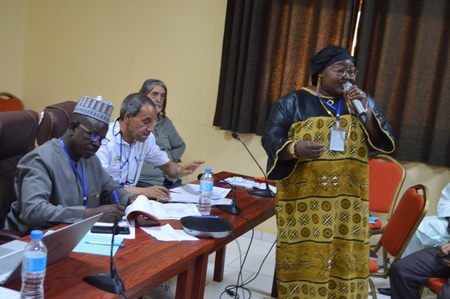
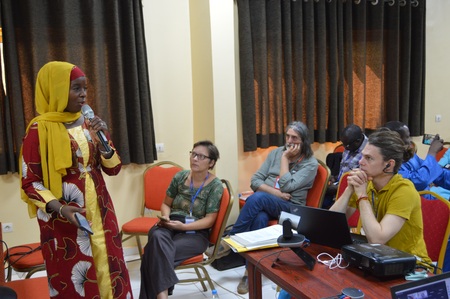
Aissata Soumaoro (AEI and APS Mali) Plenary debates...
speaking up at the conference
The debate was introduced by presentations on various aspects of migration policy:
Moctar Dan Yayé, head of communications and public relations at Alarme Phone Sahara, gave an overview of the European influence on countries' migration policies.
Abari Laouel, President of the Chambre Régionale des ONG et Associations d'Agadez (Regional Chamber of NGOs and Associations in Agadez), outlined the harmful consequences of law 2015-036 for the city and region of Agadez, and explained the extent to which this law was widely opposed, both in society and within the region's local politics.
One representative shared more testimonies and experiences from migrant communities in Niger.
Rhoumour Tchilouta, researcher at Border Forensics, presented visual and spatial methods for highlighting the relationship between security and dangers for migrants in the northern region of Niger.
Hassane Ammari of Morocco's Association of Aid for Migrants in Vulnerable Situations (AMSV) placed the problem of the criminalisation of migration in a regional and international context, presenting comparative examples of criminalising laws in Morocco and models of criminalisation that are reproduced in similar form in different national contexts. And in all these cases, the aim is to externalise borders from the side of EU states through their aid in the form of trust funds, which exert a decisive influence on the dynamics of criminalisation.
Father Mauro, a Catholic priest, has been providing practical support to migrants for many years through the Pastoral Service for Migrants (SPM), and is also involved in the Migrants in Distress Observatory (OMD). Based on this experience, he shared his thoughts on the global control of mobility as a strategy of the capitalist system.
Ali Dodo also made a statement in his capacity as Deputy General Rapporteur of the National Human Rights Commission (CNDH). Participants found it encouraging and positive that, in his capacity as representative of an institution of the State of Niger, he had vindicated much of the criticism levelled at Law 2015-036 and the consequences of its implementation. Ali Dodo urged those present to contact the CNDH in the event of human rights violations on migration routes and in connection with the controversial law. For its work, the CNDH needs to collaborate with the forces of civil society. For future struggles to get rid of repressive laws and practices that criminalise migration, having open contacts and allies within institutions such as the CNDH can be a real opportunity.
Perspectives debates: Revision or abolition of law 2015-036?
The presentations were followed by very lively and committed debates in which many of the participants were very actively involved, with a strong interest in making a difference, moving forward with the aim of defending freedom of movement and the rights of migrants and the local population alike, and achieving the fundamental revision of law 2015-036 or even its abolition.
Indeed, a sensitive issue in the debate was whether future initiatives should focus on revising law 2015-036 or abolishing it altogether. The former strategy is currently being pursued, inter alia, through the application procedure before the ECOWAS Court of Justice. On the contrary, Action Non à la Loi 2015 - 036 is mobilising to demand the total abolition of this law. However, this did not seem to be an insurmountable contradiction in terms of shared aims. We can see that the emphasis placed on the revision of Law 2015-036 makes sense, especially as regards legal procedures, as it would be legally ineffective to lodge a complaint with ECOWAS for the total repeal of this law, but more promising to lodge a complaint against certain aspects of this law and against the way it is applied. However, this does not preclude political solidarity with a view to the total abolition of this law.
Perhaps a common ground between the "revision" and "abolition" positions could be: No to all forms of application of law 2015-036 that criminalise migration, free movement and services and assistance to migrants.
At the same time, it is worth considering how civil society initiatives should position themselves in relation to the officially proclaimed objective of combating human trafficking. The participants at the conference did agree that action must be taken against criminal networks that sell and exploit people, deprive them of their freedom, rape and torture, as Amina Samuel's speech made clear. At the same time, there was agreement that the problem of real human trafficking must be strictly separated from the issue of migration and free movement, rather than being lumped together. And that freedom of movement must also be defended and re-established in order to destroy part of the business base of these criminal networks that flourish wherever there are border regimes that prevent free movement. Such a perspective could be part of a vision of free movement, but under dignified and secure conditions for all and with the right to leave as well as to stay.
Future prospects
Obviously, the near future will be important for creating real pressure at the level of Nigerien politics, as law 2015-036 is currently undergoing a review procedure.
On 15 June 2023, the Council of Ministers of the Government of Niger finally examined and adopted an amended version of the law. All that remains is for it to be adopted by the Nigerien parliament. In the current version, the "law aims to adapt the legal framework for preventing and punishing the smuggling of migrants to the standards of international human rights law and the regional and sub-regional conventions and agreements on the free movement of persons that Niger has ratified". It can be said that the addition of this paragraph to the law, which was not previously included, already demonstrates a certain success in terms of the commitments made as part of the conference and other civil society actions that have taken place in recent months. But this is just the beginning. It remains important to fight either to remove from the new version of law 2015-036 all the points that criminalise migration and migration-related services and assistance, or to abolish this law in its entirety and replace it with a new set of rules that explicitly target only human trafficking, slavery and forced prostitution.
So it is a question of translating the momentum visible at the Niamey conference on 27 and 28 February into the next practical steps.
A mailing list of conference participants and other interested persons has already been set up and a first meeting has been held to analyse the next steps to take public pressure forward.
As far as the situation in Assamaka is concerned, we can say that the visibility of this issue in this international conference circle has also strengthened our initiatives after the conference to publish a call for action in parallel with a similar statement by Doctors without Borders, which has brought about a certain change in Assamaka in the sense that new emergency aid structures have been set up. But this is far from enough, especially in view of the fact that mass deportations by Algeria continue unabated.
Remarks concerning the present situation in Niger
With the coup in Niger on 26 July 2023, the balance of power and the socio-political situation in the country have changed massively. Niger was suspended from the ECOWAS, drastic economic sanctions were imposed and the ECOWAS is threatening the country with possible military intervention. Thus, it is currently unclear whether and how the cooperation between the Nigerien state and the European border regime will continue in the future and how law 2015-036 will be applied. The demand for an end to the criminalisation of migration and the restoration of freedom of movement remains relevant in any case.
Acknowledgements
Finally, we would like to thank all those who have supported us, because it is thanks to them that the political project and the exchange have been possible. Specifically, we would like to thank the Rosa Luxemburg Foundation West Africa section, Watch the Med Alarm Phone, ASGI, Medico International, Brot für die Welt (Bread for the World), Afrique-Europe-Interact, CCFD Terre Solidaire, CRID, RD Foundation Vienna, Seebrücke Switzerland, Forum Civique, ÖH - Student Union University of Vienna, ÖH - Students' Union Accademy of Fine Arts Vienna, StV PoWi University of Vienna, BaGru IE (International Development) University of Vienna and all the groups and individuals who supported this conference with their contribution.
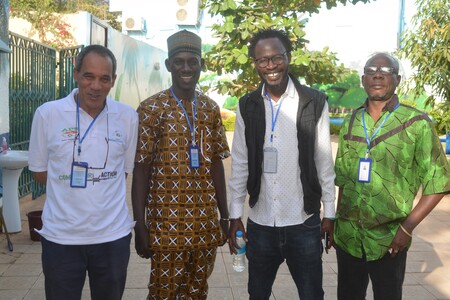
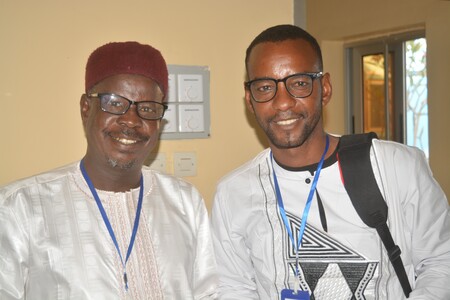
Hassane Ammari (AMSV), Moctar Dan Yayé (APS), Azizou Chéhou (coordinator) and Moctar Nalossou (head of
Saliou Diouf (Boza Fii) and Alassane Dicko (AEI) administration & finance) of the APS coordination office in Agadez

